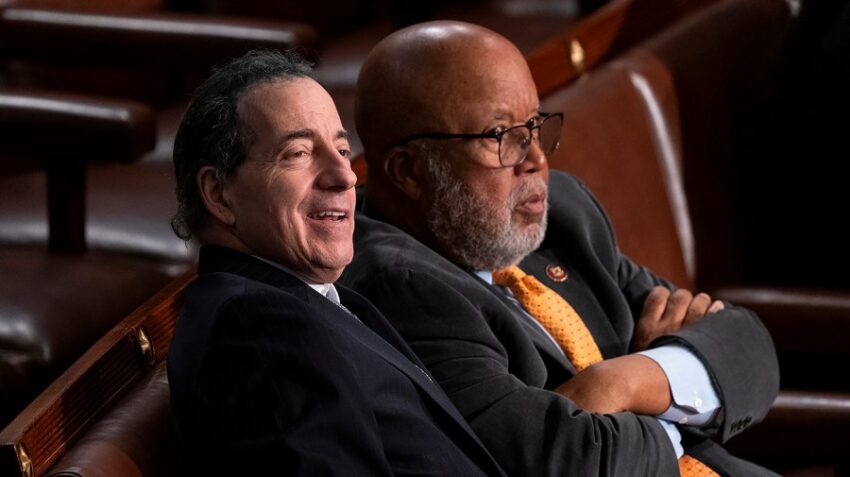A coalition of Democratic lawmakers is suing the Department of Homeland Security after the agency released a new policy seeking to limit how elected officials may visit detention centers.
Lawmakers have a right to make unannounced visits to detention centers, but the Department of Homeland Security has sought to curb visits with a new policy requiring lawmakers give a week’s notice before any visit.
The suit says all 12 Democratic lawmakers were denied access to DHS and U.S Immigration and Customs Enforcement (ICE) facilities as a result of the policy.
“The Trump Administration is systematically violating our legal right as Members of Congress to conduct oversight of DHS facilities. This blockade of Congress, deliberately interfering with our constitutional duty to perform oversight of the immigration system, is designed to stop us from checking out reports of inhumane treatment and denial of fundamental rights to immigrants in detention,” Rep. Jamie Raskin (D-Md.), the top Democrat on the House Judiciary Committee, said in a release.
“President Trump and Secretary Noem believe they can block scrutiny of their lawless immigration enforcement sweep by closing out Members of Congress. But these brazen attempts to rebuff us—in stark violation of federal law—only deepen our resolve to get information to the American people.”
Raskin, along with Reps. Adrianno Espaillat (N.Y.), Joe Neguse (Colo.), Bennie Thompson (Ala.), Robert Garcia (Calif.), Lou Correa (Calif.), Jason Crow (Colo), Veronica Escobar (Texas), Dan Goldman (N.Y.), Jimmy Gomez (Calif.), Raul Ruiz (Calif.), and Norma Torres (Calif.) are all plaintiffs in the suit.
DHS initially rolled out a policy requesting that lawmakers give 72 hours notice before visiting a facility, but replaced the guidance with stricter rules just days later. The new policy also blocks access to visits at ICE Field Offices or other ICE facilities that are not detention centers.
The move comes after DHS closed a number of other offices that provided oversight of DHS, including the Office of Civil Rights and Civil Liberties, the Office of the Immigration Detention Ombudsman as well as the Office of the Citizenship and Immigration Services Ombudsman.
“The obstruction of Congressional oversight is not just an affront to the Constitution—it’s a threat to our democracy,” Congressional Hispanic Caucus Chair Adriano Espaillat (D-N.Y.) said in a release.
“Since day one, we have witnessed the Trump Administration’s systematic efforts to dehumanize immigrants, detain tens of thousands—including U.S. citizens—and weaponize federal agencies to carry out a mass deportation agenda rooted in cruelty and chaos. The Trump Administration has consistently hindered oversight powers while gutting internal watchdogs,” he added, referencing the three offices, “creating the perfect storm for abuse and impunity.”
The suit argues that the new policy violates provisions of various appropriations bills that say agency funds cannot be used to block lawmakers from visiting facilities.
The law has its roots in the first Trump administration, enacted after Escobar and other lawmakers had trouble gaining access to ICE facilities.
The Department of Homeland Security dismissed the suit as a fundraising effort.
“These Members of Congress could have just scheduled a tour; instead, they’re running to court to drive clicks and fundraising emails,” spokeswoman Tricia McLaughlin said in a statement.
“As for visits to detention facilities, requests should be made with sufficient time to prevent interference with the President’s Article II authority to oversee executive department functions—a week is sufficient to ensure no intrusion on the President’s constitutional authority. To protect the President’s Article II authority, any request to shorten that time must be approved by the Secretary.”
Brought in coordination with Democracy Forward and American Oversight, the suit says the new policy violates Section 527 of the fiscal year 2024 DHS appropriations bill as well as the Administrative Procedures Act.
The suit also argues there are downsides to scheduled visits, citing a 2020 House Homeland Security report that found advanced notice allowed DHS to shift its practices.
“The report emphasized that when congressional staff provided advance notice of oversight visits, ‘ICE facilities used the advanced warning to improve the conditions within the facility.’ Staff detected evidence of those improvements, including the smell of fresh paint, evidence of a major clean-up, the relocation of individuals from solitary cells to the general population, and the installation of new guards,” the suit states.
Those experiences, they argue, “demonstrate the importance of conducting that oversight in real time, without prior notice.”
Updated at 5:19 p.m.
 Read: Read More
Read: Read More




